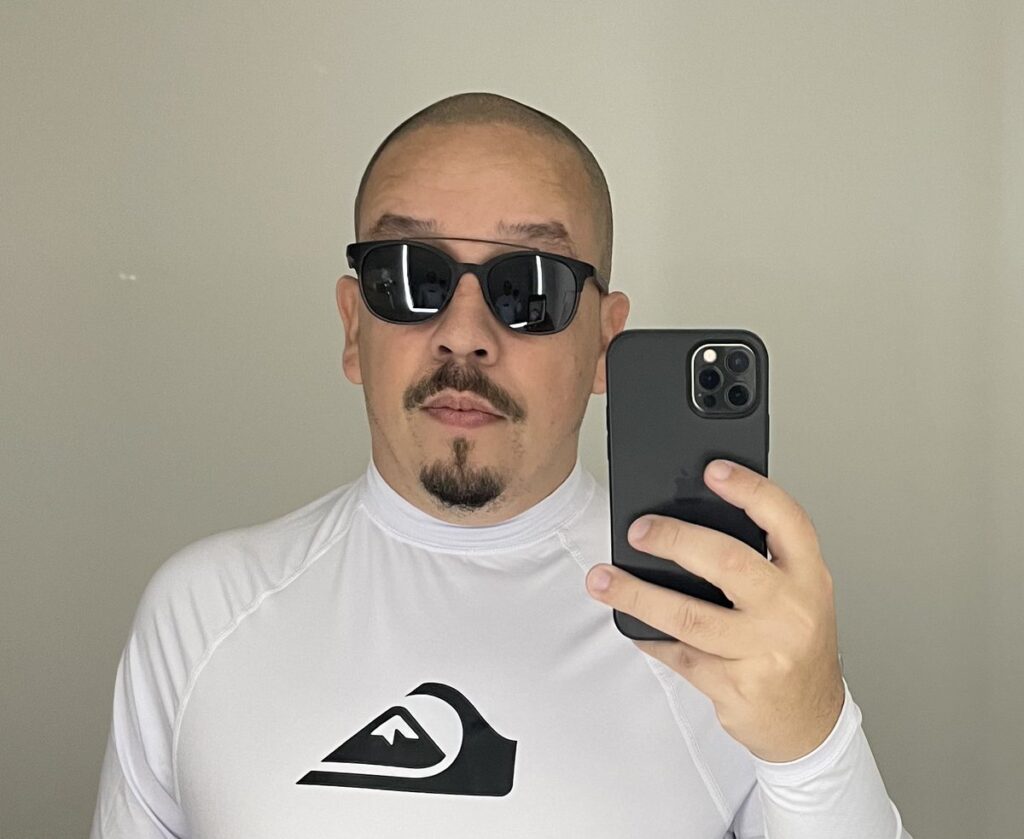‘I didn’t think I belonged’: Q&A with Shea Serrano, the winner of NAHJ’s humanitarian award
Writing wasn’t exactly a last-ditch career for Shea Serrano — but it wasn’t his first choice either.
The New York Times best-selling author and writer, who has amassed a Twitter following of more than 422,000 and frequently contributes dispatches on sports and pop culture for publications like The Ringer and Grantland, said his dreams of playing professional ball in the NBA were dashed when he stopped growing.

“Mexicans don’t get so tall,” he said in a Zoom interview Monday with the Latino Reporter. “So it didn’t work out that great for me.”
Today, he doesn’t dream quite so big.
The acclaimed writer told the Latino Reporter that he has never been much of a clout chaser — he doesn’t do the work he does because he hopes to win flashy awards or someday star in a hit film. He just wants to make enough money to support his aging parents and put his kids through school.
“I write whatever anybody will give me money to write,” he said. “That’s what I do.”
The decision to pursue writing seems to be paying off. Serrano is being honored at the 2021 virtual conference of the National Association of Hispanic Journalists with the Sí Se Puede Award, an honor that recognizes individuals who advocate for Latino voices in their communities.
With his unique personality and humor, Serrano continues to push for Latino representation and inclusivity throughout his work.
Serrano downplayed his contributions to the community — and the industry. He credited his “army” of followers who pounce on opportunities to support his work and, at his direction, send money to individuals in need.
“I sit at my desk and type things into a computer,” he said. “That’s my whole day, every day.”
But Serrano also hands out his own money. Last year, in the early months of the pandemic, Serrano used profits from his book to help pay strangers’ bills.
Serrano said he is “perpetually grateful” that he spend his days writing, tweeting and talking to people — things he doesn’t really consider real work — instead of doing a “hard job,” like teaching. Serrano would know, he spent several years as a middle school teacher.
Anytime he feels frustrated or annoyed with his work, “I just remember I was working 70 hours a week before, for a fraction of the pay doing this other job, which was real actual work compared to this.”
Serrano shared with the Latino Reporter his reaction to receiving the award, his beginnings as a journalist, the importance of the Latinx representation and more:
Latino Reporter: How did you find out that you won the Sí Se Puede Award and what does that phrase mean to you?
Serrano: I think NAHJ tagged me on Twitter when they announced, and that’s how I saw it, and then a bunch of people started messaging me which was cool. I was excited that they listed my name on the thing. I didn’t think I belonged up there, so to win was even extra cool. [Sí Se Puede] is a cool phrase because it’s whatever the thing you want to do, you can do it. It’s like Nike’s ‘Just do it,’ but it’s our version of that. It’s like whatever you want to try, sí se puede and you can do it.
LR: Why did you feel like you didn’t belong?
Serrano: It’s always weird to get nominated for any sort of award. It just feels like surely there are more deserving people. Then when they tell you that you won because you were advocating for Latinos in journalism or you set up some scholarship, it always boils down to some s— I did on the computer or in my cell phone. It’s not like I was out in the world doing anything, it always makes me feel silly.
LR: How did you become interested in journalism?
Serrano: This was straight up, I just needed extra money. I was teaching, Larami [Serrano’s wife] was a teacher, we thought we were going to do that forever. She was on bed rest from month four until the twins were born, so a couple of months, and we were like ‘oh we ran out of money real quick.’ I needed something I could do in my free time, and was literally Googling work-from-home jobs on the internet. Writer was on the list, and I’m like, it says all I need is the internet and a computer, and I have both of those so I guess I’ll try that. I guess that is all I did. And it just became bigger and bigger and bigger.
LR: What are some interesting stories you covered?
Serrano: The weirdest thing I ever wrote about is — I had no idea men can breastfeed. That’s like a thing they can do, like, some can. I wrote about it for Mental Floss Magazine and that was the strangest thing to research.
LR: Have you ever received push back because of your identity?
Serrano: The most blatant stuff came the past four years when Trump was president. That was when I got the most on the internet. When I would tweet, people would always respond a bunch of ‘go back to Mexico’ type s—, like, not even good or creative racism. Like the most basic, boring kind. But that’s been the main brunt of it. I have not been harassed or anything in real life. It’s all internet, you know?
Denisse Quintanilla is a senior at Monmouth University, where she studies Spanish and communications with a concentration in media studies and production. She is an intern at CNBC En Español and is pursuing a career in broadcast journalism. Reach her at denissequintanilla9 [at] gmail [dot] com and on Twitter @denisseqtv.